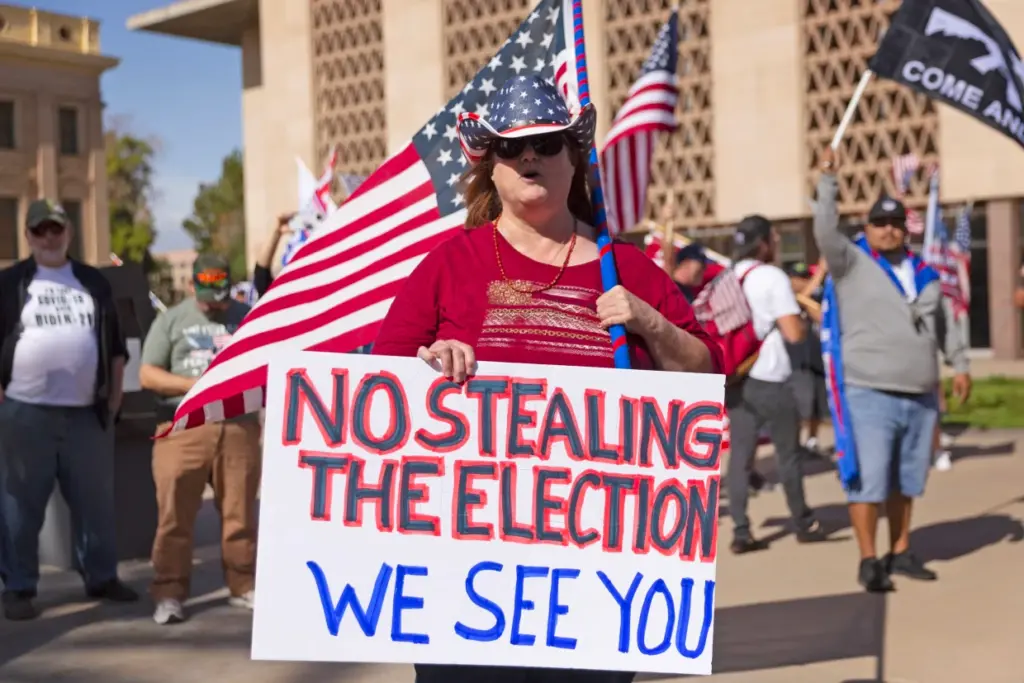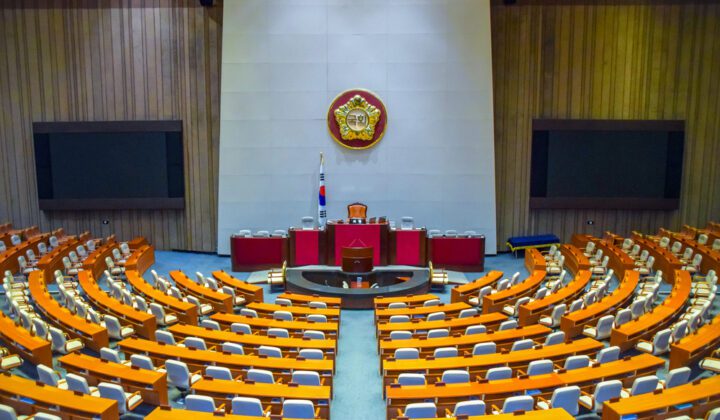Welcome to the Democracy Brief. Before we get to the story, check out this week’s Winter is Here podcast episode where Bill Kristol, former Republican strategist extraordinaire joins Uriel and Garry to discuss how Putin’s war in Ukraine, Trump’s impeachment, and the January 6th hearings are connected and what we can do to get people to care about defending freedom domestically and internationally.
Listen Episode
Now, back to voting rights.
The bipartisan gun control bill advances in Congress, with Senate Minority Leader Mitch McConnell announcing Tuesday that he is a tentative “yes” on the draft legislation. The gears of Congressional compromise are slowly turning, shedding decades of rust. Now we should be asking: can we slip in a deal to strengthen our democracy before they grind to a halt?
Our elections are in a bad way, and it’s not just the near-coup on January 6th we have to contend with. Democrats are terrified that new restrictions in Republican-controlled states could depress turnout and usher on what President Joe Biden called “Jim Crow in the 21st Century.”
But that’s not what scares me most. Voters are more resilient to changes to the voting process than you might suspect, and specific proposals to expand voting access may not change the electoral landscape all too much. In fact, there is remarkably scant evidence that the unprecedented rise of vote-by-mail in 2020 affected turnout at all. The negative effects of new voting restrictions shouldn’t be understated as even small changes in turnout could flip elections, but they shouldn’t be conflated with Jim Crow either. Most people that want to vote are going to go out and do it, regardless of whether they can vote by mail or have to go in person.
The greatest threat to our democracy is the belief that elections are illegitimate, spreading like a cancer through the American electorate. Faith in elections among Republican voters is catastrophically low, with only 3 in 10 Republicans believing that our elections are conducted fairly compared to some 9 in 10 Democrats. In all, two-thirds of Republicans believe that the 2020 presidential election was stolen.
These voters are wrong that our elections are untrustworthy, but that doesn’t really matter. The popular legitimacy of elections is more a matter of faith than reality, and if people don’t believe that elections are conducted fairly, then they will make sure their voice is heard some other way—as the January 6th rioters remind us. Widespread concerns about election integrity can’t be ignored, even if they lack a basis in reality.
So what could voting rights compromise look like?
Congress should balance two priorities: boosting faith in our electoral process and making it as simple as possible for those who can legally vote to exercise their right. Accordingly, they should limit practices that degrade public faith without significantly boosting turnout, and promote the practices that do the opposite. As a starting point, Congress could:
1. Expand Early In-person Voting
In 2016 about a quarter of voters cast their vote by mail and in 2020, that proportion spiked to more than 40 percent. Yet as more and more Americans choose to cast their ballot that way, distrust is only increasing. According to polling from R Street, 82 percent of Republicans are opposed to no excuse vote-by-mail.
Voting by mail isn’t going anywhere, but we can reduce its use by expanding access to its most trustworthy substitute: early in-person voting. 59 percent of Republicans and 78 percent of Democrats support a proposal to permit at least two weeks of early in-person voting, addressing Democratic concerns about congestion on Election Day and Republican concerns associated with mail-in voting.
Early voting also carries a substantial administrative upside: it gives election officials time to gain experience and discover problems early, while also giving voters more time to correct registration errors should they arise.
2. Bring on the Voter IDs and Same-Day Registration
Democrats should be prepared to make concessions on voter ID laws, especially if they are able to trade them for same-day voter registration (SDVR).
There are two key facts about voter ID laws that liberal opponents should recognize. First, they are very popular across the aisle: 61 percent of Democrats and 93 percent of Republicans support them. Second, a 2017 review of available evidence found that of studies with “suitable research designs,” most “find modest, if any, turnout effects of voter identification laws.” Voter ID requirements aren’t the turn-out-killer they’re chalked up to be.
That said, it is true that 11 percent of Americans lack government-issued photo IDs. Thus, we would have to pair voter ID laws with reforms to make it easier to obtain an acceptable ID. These might include expanding the number of ID offices, especially in disadvantaged areas, and the hours during which they are open; reducing the cost of supporting documentation; and making new forms of ID (e.g., student IDs) acceptable.
On the other hand, same-day voter registration could boost turnout substantially while maintaining election security. Of the 20 states with SDVR, all require voters to show ID. Cross-agency and interstate verification of voter information, as well as state-wide systems that ensure that a voter has not already registered and voted could be made mandatory. Even with these protections, SDVR has a very large effect in promoting voting access. Studies generally estimate that it increases turnout by an average of five percentage points, and a new analysis by researchers from the University of Massachusetts and the think tank Demos has found large gains among Black and Latino voters.
3. Restrict the Most Contentious Voting Practices
Three minor practices cast a lot of doubt on the legitimacy of elections:
- Permitting political operatives to take part in “ballot harvesting,” or collecting completed ballots and submitting them on behalf of other people.
- Making the mail-in ballot postmark deadline election day, and
- Waiting until after polls close to start processing mail-in ballots
None of these practices are worth the damaging effects they have on faith in elections. Ballot harvesting appears rife for manipulation and feeds wild conspiracies about operatives stuffing ballot boxes.
Allowing individuals to mail in their ballots all the way up to and on election day is unnecessary when individuals are given weeks to mail them in beforehand and are able to deliver it in person on election day if need be. A better system would require ballots be postmarked two or three days before the election in order to be counted, minimizing those arriving late.
And waiting to process and count mail-in ballots until after polls close unnecessarily delays reporting. In 2020, those delays contributed to the false impression that Trump had won on election night, only for Democrats to “find votes” and surge ahead after most voters went to sleep. All of these practices should be phased out.
4. Replace the ECA
The Electoral Count Act of 1887 outlines the process for how electoral votes will be tallied and a new president will be determined. Unfortunately, it’s a process that is favorably described as “extraordinarily complex” and more accurately “almost unintelligible.”
The Electoral Count Act is an invitation for a coup, as, according to some rogue lawyers, it empowers the vice president to exercise exceptional authority in determining whether or not to respect the electoral votes that a state submitted. Every four years, we put our vice presidents to the ultimate test by asking them to decide if they would like to try to kill American democracy and declare a new tyrant. I’m grateful to Mike Pence for passing this test despite the president lobbying him otherwise and a mob chanting outside that they will hang him if he didn’t follow its bidding, but we should ensure we never land in this position again. Replacing the Electoral Count Act must be a top priority for Congress in the coming months.
Could these changes even be passed?
Compromise is hard, but Democrats are trending pragmatic after learning the hard way that an overly expansive agenda is doomed. (Who in Washington has the chutzpah to utter the words “Build Back Better?”)
Meanwhile moderate Republicans have expressed their willingness to engage in conversations on election reform. A bipartisan group of Senators announced last week that they have reached a general consensus on Electoral Count Act reform and plan to hammer out the details in the coming weeks.
Broader voting rights legislation might not be out of reach either. Back in January, Pennsylvania Republican Congressman Brian Fitzpatrick proposed the Restoring Faith in Elections Act, calling for, among other things, automatic voter registration, federal standards for mail-in ballots, voter ID requirements, and standards for maintaining accurate voter rolls. As a starting off point, it will have a much higher likelihood of turning into something mutually agreeable than the sweeping For the People Act (also known as H.R.1).
The massacre in Uvalde is an inflection point in the history of American gun control, potentially ushering in a modest bipartisan gun control law that would have seemed impossible months ago. As the January 6th Committee presents its findings to the public, we must make sure that the chaos of the 2020 election and the events of January 6th are another such inflection point. Terrible moments demand action, and we can’t afford to do nothing.





